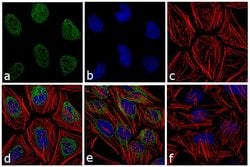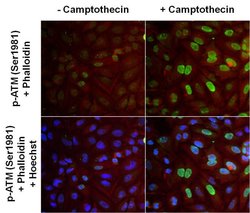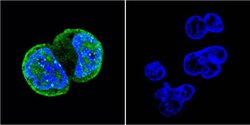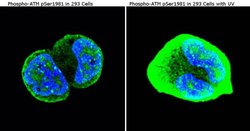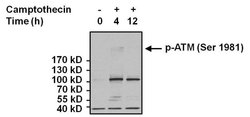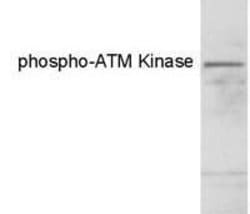Learn More
Invitrogen™ Phospho-ATM (Ser1981) Monoclonal Antibody (10H11)
Mouse Monoclonal Antibody
Supplier: Invitrogen™ MA12020
Description
MA1-2020 detects the phospho-ATM kinase in human and mouse samples. MA1-2020 has been successfully used in immunofluorescence, immunoprecipitation and Western blot procedures. By Western blot this antibody detects a ~370 kDa protein representing the phospho-ATM kinase in crude lysates from gamma irradiated HeLa cells. In immunofluorescence procedures, MA1-2020 recognizes the phospho-ATM kinase in irradiated human and mouse fibroblasts. The MA1-2020 immunogen is a phosphorylated synthetic peptide corresponding to the residues S(1974) L A F E E S(p) Q S T T I S S(1988) of human ATM Kinase protein.
Ataxia-telangiectasia Mutated (ATM) is a protein that belongs to the PI3/PI4 kinase family. Ataxia-telangiectasia is a rare autosomal recessive disorder characterized by progressive neurologic degeneration, immunologic deficiency, and an increased risk of lymphoid cancer. The ATM gene codes for a protein belonging to the phosphoinositide 3-kinase (PI3K) superfamily. ATM phosphorylates proteins instead of lipid and has many downstream targets that act as cell-cycle regulators including: P53, Mdm2, BRCA1, and SMC1. The ATM protein is responsible for repairing double-stranded DNA breaks that occur because of ionizing radiation and other mutagens. The ATM's C-terminal region has extensive homology to the catalytic domains of phosphatidylinositol 3-kinases (PI3 kinases). Studies have shown that ATM becomes autophosphorylated and upregulated by exposure to ionizing radiation. AT cells are hypersensitive to ionizing radiation, impaired in mediating the inhibition of DNA synthesis and display delays in p53 induction. Further, DNA damage caused by ionizing irradiation activates ATM-kinase, leading to a cascade of kinase reactions that regulate cell cycle, apoptosis, and DNA damage repair. Studies have linked ATM to apoptosis along with Nbs1 and Chk2 in the E2F1 pathway.
Specifications
| Phospho-ATM (Ser1981) | |
| Monoclonal | |
| 1 mg/mL | |
| PBS with 1mg/mL BSA and 0.05% sodium azide | |
| Q13315, Q62388 | |
| ATM | |
| Synthetic peptide corresponding to residues S(1974) L A F E E S(p) Q S T T I S S(1988) of human ATM Kinase protein. | |
| 200 μg | |
| Primary | |
| Human, Mouse | |
| Antibody | |
| IgG1 |
| Immunoprecipitation, Western Blot, Immunocytochemistry | |
| 10H11 | |
| Unconjugated | |
| ATM | |
| AI256621; AT mutated; A-T mutated; A-T mutated homolog; AT mutated protein; AT1; ATA; Ataxia t; Ataxia telangiectasia gene mutated in human beings; ataxia telangiectasia mutated; Ataxia telangiectasia mutated homolog; ATC; ATD; ATDC; ATE; Atm; ATM serine/threonine kinase; C030026E19Rik; DKFZp781A0353; EC 2.7.1.37; MGC74674; serine-protein kinase ATM; TEL1; TEL1, telomere maintenance 1, homolog; TELO1 | |
| Mouse | |
| Protein G | |
| RUO | |
| 11920, 472 | |
| -20°C, Avoid Freeze/Thaw Cycles | |
| Liquid |
Safety and Handling
Your input is important to us. Please complete this form to provide feedback related to the content on this product.
